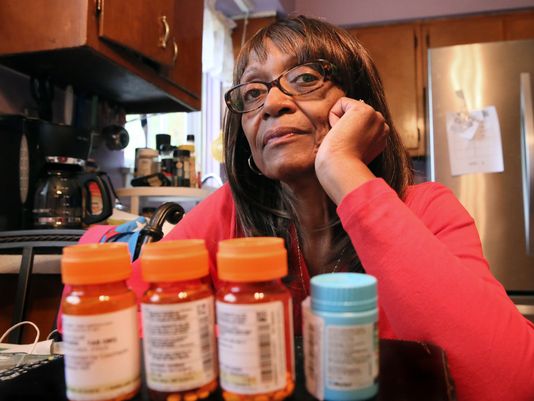Category: Drugs
USA grapples with high drugs costs
 Volume 386, Number 10009
Volume 386, Number 10009
28 November 2015
WORLD REPORT More Americans are getting health insurance, including coverage for prescription drugs, but high prices may make them inaccessible. Susan Jaffe, The Lancet’s Washington correspondent, reports.
Patients in the USA pay more for prescription drugs than almost anywhere else in the world, forcing as many as one in four who can’t afford the high prices to go without their medicine last year, according to a Kaiser Family Foundation survey. So even though more Americans have health insurance, the new therapies and cures that can prevent more expensive health complications might be out of reach.
After several well-publicised, huge spikes in drug prices—including Turing Pharmaceutical’s increase for pyrimethamine (marketed as Daraprim) from US$13·50 to $750 a pill—the problem is drawing unprecedented attention from nearly every quarter: the Obama Administration, Congress, state officials, health insurance companies, drug makers, as well as the physicians and their patients who have clamoured for help for years. It also surfaced during this month’s Democratic presidential debate.
Heather Block, a patient advocate from Delaware who spoke at a day-long pharmaceutical forum hosted by the US Department of Health and Human Services (HHS) earlier this month, pays $9800 a month for the drugs she takes to treat breast cancer that has spread to her liver and lungs. Although she has Medicare coverage, she is still responsible for a share of her medical expenses. “Innovation is meaningless if nobody can afford it”, she said. “I still face financial insecurity and eventually bankruptcy—if I live that long.” [Continued here ]
…Don’t Just Renew Your Medicare Plan. Shopping Around Can Save Money.
By Susan Jaffe | October 15, 2015 | Kaiser Health News in collaboration with Money magazine
Ten years after a prescription drug benefit was added to Medicare, 39 million older or disabled Amer icans have coverage to help pay for their medicine, including most of the 17 million with private insurance policies known as Medicare Advantage, an alternative to traditional Medicare.
icans have coverage to help pay for their medicine, including most of the 17 million with private insurance policies known as Medicare Advantage, an alternative to traditional Medicare.
The annual enrollment period for these private drug and Advantage plans for 2016 starts Thursday and runs through Dec. 7.
period for these private drug and Advantage plans for 2016 starts Thursday and runs through Dec. 7.
It pays to shop around. The monthly cost is increasing an average 26 percent for UnitedHealthcare’s AARP MedicareRx Saver Plus while the First Health Value Plus plan
is dropping an average 13 percent, according to an analysis of the 10 most popular drug plans by Avalere Health, a research firm.
Some actual costs may be even more dramatic. In Albany, N.Y., the price of a Cigna-HealthSpring drug plan is going up 36 percent, according to the StateWide Senior Action Council, a New York consumer group. [More in Kaiser Health News or Money magazine]
…End in sight for revision of US medical research rules
 Volume 386, Number 10000
Volume 386, Number 10000
26 September 2015
WORLD REPORT End in sight for revision of US medical research rules US health officials expect to update 25-year-old regulations on human participation in research by the end of next year. Susan Jaffe, The Lancet’s Washington correspondent, reports.
After proposing massive changes 4 years ago to rules first issued in 1991 protecting people participating in research studies, federal health officials produced yet another revision earlier this month and say the effort to update the rules is on a fast track.
The revolution in science, technology, medicine, and public involvement that has transformed biomedical research over the past 25 years might be sufficient reason for the latest update, a daunting task that began in 2009, shortly after Barack Obama became president. But now there’s another factor driving the effort. [Continued here]
…Planning for US Precision Medicine Initiative underway
Volume 385, Issue 9986, 20 June 2015
WORLD REPORT Officials expect to launch the US President’s new health project later this year. But Congress has yet to decide whether to fully fund it. The Lancet’s Washington correspondent, Susan Jaffe, reports.
While continuing to defend his besieged health-care reform law against lawsuits and repeal threats, US President Barack Obama is championing a new health initiative. This one also has a bold goal: to radically change the medical treatment patients receive in the USA. “I want the country that eliminated polio and mapped the human genome to lead a new era of medicine—one that delivers the right treatment at the right time”, the President said when he unveiled his Precision Medicine Initiative (PMI) in his annual State of the Union address to the nation in January. …Central to the PMI will be the creation of a research cohort of 1 million US volunteers who agree to provide researchers with biological, environmental, lifestyle, and other information as well as tissue samples….The effort to vastly expand the scope and practice of individually designed treatments based on genetic information could revolutionise medicine, supporters say. But the success of the PMI depends on whether Congress agrees to fund it. [Continued in full text or PDF ] …
Obamacare, Private Medicare Plans Must Keep Updated Doctor Directories In 2016
By Susan Jaffe | March 9, 2015 | Kaiser Health News and also published in 
Starting next year, the federal government will require health insurers to give millions of Americans enrolled in Medicare Advantage plans or in policies sold in the federally run health exchange up-to-date details about which doctors are in their plans  and taking new patients.
and taking new patients.
Medicare Advantage plans and most exchange plans restrict coverage to a network of doctors, hospitals and other health care providers that can change during the year. Networks can also vary among plans offered by the same insurer. So it’s not always easy to figure out who’s in and who’s out, and many consumers have complained that their health coverage doesn’t amount to much if they can’t find doctors who accept their insurance. [More from KHN] [More in USA Today]
…
21st Century Cures Act progresses through US Congress
![]() Volume 385, Issue 9983, 30 May 2015
Volume 385, Issue 9983, 30 May 2015
WORLD REPORT A bill to speed up the translation of biomedical discoveries is getting wide support, but some argue that it is not adequately funded. Susan Jaffe, The Lancet’s Washington correspondent, reports.
An ambitious bipartisan plan to accelerate medical innovation in the USA is moving ahead in a Congress famous for political gridlock.
The proposed 21st Century Cures Act was approved unanimously on May 21 by the US House of Representatives’ Committee on Energy and Commerce. The massive bill would promote discovery of new medicines and get them to patients more quickly. But the bill’s bipartisan support nearly collapsed when Democrats insisted on additional funds for the two federal agencies intricately involved in carrying out the bill’s far-reaching provisions.
Behind-the-scenes discussions finally yielded an infusion of US$10 billion over 5 years for the National Institutes of Health (NIH). Shortly before the committee vote, $550 million over 5 years was added for the Food and Drug Administration (FDA), which is responsible for ensuring new treatments are safe and effective. …But funding for both agencies did not come easy, is still uncertain, and might fall far short of what is needed. [Continued full text or PDF]…
US FDA: the Margaret Hamburg years

Volume 385, Issue 9970, 28 February 2015
WORLD REPORT US Food and Drug Administration commissioner Margaret Hamburg is stepping down after nearly 6 years in office. The Lancet‘s Washington correspondent, Susan Jaffe, reports on her achievements.
Margaret Hamburg
At the end of March, Margaret Hamburg is leaving what has got to be one of the toughest unelected US Government jobs outside of the Pentagon—commissioner of the US Food and Drug Administration (FDA).
A champion of science-based regulation and streamlined approvals for breakthrough drugs, the Harvard-trained physician is one of the two longest-serving FDA commissioners in five decades.
The FDA is responsible for the safety of 20% of the products Americans buy, including more than US$1 trillion dollars worth of goods that might seem to have little in common, such as artificial hips, dietary supplements, gene therapy, surgical lasers, prescription drugs for human beings and animals, nanotechnology products, cosmetics, blood and biologics products, tobacco, and—last but not least—most of the food we eat (excluding meat and poultry, which are the domain of the agriculture department). The agency has 16 000 employees. [article continued in full text or PDF]
…
Medicare Modifies Controversial Hospice Drug Rule
By Susan Jaffe | July 18th, 2014 | KAISER HEALTH NEWS
In response to strong criticism, Medicare officials are modifying rules intended to prevent the agency from paying twice for the same prescriptions for seniors receiving hospice care.
Under the rules that took effect in May, hospice patients or their families could not fill prescriptions through their Part D drug plans until first confirming that the prescriptions were not covered by hospice providers. Drugs related to palliative and comfort care are supposed to be covered under the fixed rate payments to the hospice.

Medicare announced Friday that the rules would be revised so that the additional authorization would be required for only four types of medications: pain relievers, anti-nauseants, laxatives, and anti-anxiety drugs that are “nearly always” considered hospice-related.
“Medicare really tried to address our concerns quickly and effectively,” said Terry Berthelot, a senior attorney at the Center for Medicare Advocacy. [MORE] …
Link
By Susan Jaffe | October 15, 2013 | Kaiser Health News produced in collaboration with 
The seven-week enrollment period for next year’s Medicare prescription drug and managed-care plans begins Tuesday, but seniors shouldn’t simply renew their policies and assume the current coverage will stay the same. There’s a likely payoff for those who pay close attention to the details.[More in KHN] [More in USA Today]
Seniors Cautioned To Pay Close Attention To Details As Enrollment Begins In Medicare Plans
Link
Susan Jaffe | November 5. 2012 | Kaiser Health News produced in collaboration with 
Medicare officials are trying a novel approach during this open enrollment season to gently nudge a half million beneficiaries out of 26 private drug and medical plans that have performed poorly in the past three years. It begins with letters informing seniors they are enrolled in a plan that received low ratings.
The effort marks the first time that Medicare officials have tried to steer beneficiaries away from some private drug and medical plans, while still allowing them to operate. Officials have also warned the plans that they might be canceled in the future. [More] [List of the 26 plans and areas served available here].
Link
A new law passed in July to strengthen the work of the US Food and Drug Administration may hit some serious barriers to implementation. Susan Jaffe reports from Washington, DC.
![]() WORLD REPORT Volume 380, Issue 9852, Pages 1458 – 1459, 27 October 2012
WORLD REPORT Volume 380, Issue 9852, Pages 1458 – 1459, 27 October 2012
The massive drug and medical device safety bill that won extraordinary near-unanimous support in the US Congress—despite a budget crisis and a contentious political campaign—is facing major challenges less than 3 months after President Barack Obama signed it into law in July. And in the process, prospects may be fading for additional reforms. [MORE]
Link
Today, Medicare beneficiaries can begin choosing their drug and medical coverage for 2013, and most seniors are expected to stick with the same policies they have already, despite price changes and a rating system that shows some plans may be  better than others. Seniors have been reluctant to change plans, even if there are cheaper or better-rated alternatives, according to recent studies and seniors advocates. Beneficiaries also tend to stay with the same insurers: This year more than a third of those in Medicare Advantage plans, which provide medical and drug coverage, chose policies from just two insurers, UnitedHealthcare or Humana.
better than others. Seniors have been reluctant to change plans, even if there are cheaper or better-rated alternatives, according to recent studies and seniors advocates. Beneficiaries also tend to stay with the same insurers: This year more than a third of those in Medicare Advantage plans, which provide medical and drug coverage, chose policies from just two insurers, UnitedHealthcare or Humana.
The ratings are based on information reported by the plans, from Medicare records, and a yearly survey of some beneficiaries. Participation in the surveys is voluntary and anonymous but insurers are concerned that too many seniors opt out. [more]
Enrollment Season Opens For Medicare Advantage And Drug Plans
Link
Billions of dollars in drug savings for Medicare beneficiaries may come to an end if the Supreme Court overturns the 2010 federal health law, a drug industry spokesman said Tuesday. The law provides “the necessary legal framework” for drug companies to slash brand-name drug prices by half for seniors and people with disabilities when they enter a coverage gap in their Medicare drug plans, said Matthew Bennett, a spokesman for the Pharmaceutical Research and Manufacturers of America. Eventually the discounts grow so that the gap, known as the doughnut hole, is closed by 2020. But if the law goes, the discounts may go, too.
More than 5.1 million Medicare beneficiaries enrolled in the Part D drug plans saved more than $3.2 billion on prescription drugs from March 2010 through December 2011 because of the health law provision, according to the Centers for Medicare & Medicaid Services. In the first four months of this year, seniors saved another $301.5 million. [MORE at msnbc] [MORE at Kaiser Health News]
Link
$18 For A Baby Aspirin? Hospitals Hike Costs For Everyday Drugs For Some Patients
By Susan Jaffe | April 30, 2012 | KAISER HEALTH NEWS produced in collaboration with 
For the price Diane Zachor, 66, was charged for one pill to control high pressure during her 18 hour stay at St. Luke’s Hospital In Duluth, Min n., she could have bought a three-week supply. In South Florida, Pearl Beras, 85, of Boca Raton, Fla., said her hospital charged $71 for one blood pressure pill for which her neighborhood pharmacy charges 16 cents. Several other Medicare patients in Missouri were billed $18 for a single baby aspirin, said Ruth Dockins, a senior advocate at the Southeast Missouri Area Agency on Aging.
n., she could have bought a three-week supply. In South Florida, Pearl Beras, 85, of Boca Raton, Fla., said her hospital charged $71 for one blood pressure pill for which her neighborhood pharmacy charges 16 cents. Several other Medicare patients in Missouri were billed $18 for a single baby aspirin, said Ruth Dockins, a senior advocate at the Southeast Missouri Area Agency on Aging.
It’s no mistake: When Medicare patients are in hospitals for observation, they can be charged any amount for routine drugs to treat chronic conditions such as diabetes, high blood pressure or high cholesterol. Medicare doesn’t cover these type of medications and doesn’t require hospitals to tell patients when they are in observation status or that they will be responsible for paying any non-Medicare-covered services.
“I just couldn’t believe some of these prices they charge,” said Zachor (left). “It’s just atrocious.” [More from USA Today or from Kaiser Health News]
Link
Three weeks after suffering a heart attack, Bernie Hollander came to a recent meeting at Leisure World in Silver Spring with his wife, Rose, to learn about the Medicare drug plans being offered next year. “I’m a heart patient, I’m a diabetic – I have a lot of problems,” said Hollander, 81, who lives in the retirement community. But getting the expensive medications he needs isn’t one of them. e was at the meeting to get updated advice from Leta Blank, head of the Montgomery County Senior Health Insurance Assistance Program (SHIP).
Although drug coverage is optional, millions of Medicare beneficiaries enroll in a plan, and choosing the right one can be tricky. Seniors who want drug coverage must sort through dozens of policies covering different drugs from different pharmacies at different prices. Federal SHIP counselors can help untangle the details. MORE [view video here]
During open enrollment season, seniors can get help picking a Medicare drug plan
Doctors skittish about health technology despite promise of big federal bucks
By Susan Jaffe | Center for Public Integrity | July 7, 2011
The goal is to bring the last outposts of the nation’s health care system into the computer age, linking medical providers so that they can  coordinate and improve patient care and — in the process—reduce unnecessary health care spending. But convincing everyone to use electronic health records has not been easy. …Neither reward nor punishment has
coordinate and improve patient care and — in the process—reduce unnecessary health care spending. But convincing everyone to use electronic health records has not been easy. …Neither reward nor punishment has 
persuaded some small practice doctors — a troubling omen for the Obama administration, which believes that conversion of paper records to electronic form is a crucial step toward health care reform. [Continued]
…Innovative Day-Care Program Seeks To Keep Frail, Low-Income Seniors In Their Homes
By Susan Jaffe | December 21, 2010 | Kaiser Health News in collaboration with 
Several mornings a week, a white van stops at Geraldine Miller’s house just east of Baltimore to pick her up for ElderPlus, a government-subsidized day-care program for adults on the campus of the Johns Hopkins Bayview Medical Center.
Because  Miller, who is 75 and uses a walker, has trouble getting down the stairs from her second-floor apartment, the driver comes inside to help. When she feels wobbly, he lends her an arm. When she feels strong, he faces her and steps down backward on the steps so he can catch her if she falls. When it rains, he shelters her with an umbrella. This is the sort of extra care that makes ElderPlus different. ElderPlus is part of PACE, the Program for All-Inclusive Care for the Elderly, which provides comprehensive medical and social services to frail, low-income seniors with serious health problems. [Continued at Kaiser Health News or The Washington Post.] Video: “Picking Up The Pace”
Miller, who is 75 and uses a walker, has trouble getting down the stairs from her second-floor apartment, the driver comes inside to help. When she feels wobbly, he lends her an arm. When she feels strong, he faces her and steps down backward on the steps so he can catch her if she falls. When it rains, he shelters her with an umbrella. This is the sort of extra care that makes ElderPlus different. ElderPlus is part of PACE, the Program for All-Inclusive Care for the Elderly, which provides comprehensive medical and social services to frail, low-income seniors with serious health problems. [Continued at Kaiser Health News or The Washington Post.] Video: “Picking Up The Pace”
… Medicare Steps Up Efforts To Monitor Seniors’ Prescriptions
By Susan Jaffe | KAISER HEALTH NEWS | March 23, 2010
This story was produced in collaboration with![]()
Irene Mooney survived four heart attacks and still copes with high cholesterol, persistent indigestion and heart problems. Recently, she developed some dangerous new symptoms – suspicious bruising all over her body and severe fatigue. “I could barely put one foot in front of the other,” she says. A pharmacist discovered the culprit: Some of the very medications Mooney was taking to manage her medical conditions.
The pharmacist met with Mooney, examined her 13 medications and then contacted her doctor, who cut the dosage of one drug and replaced another, reducing her risk of uncontrollable bleeding. Mooney, 82, one of the devoted card players at her seniors’ complex, soon noticed the change. “I’ve been so much better,” she says.
The help Mooney got – called “medication therapy management” – was provided by Senior PharmAssist, a Durham, N.C., non-profit group that makes sure seniors use the right prescription drugs and take them correctly to prevent harmful side effects or drug interactions.
Now, medication management is coming to nearly 7 million seniors and disabled Americans enrolled in Medicare drug plans. [Continued at Kaiser Health News and USA Today
…
Link
By Susan Jaffe | March 22, 2010
KAISER HEALTH NEWS in partnership with ![]()
Medication management is coming to nearly 7 million seniors and disabled Americans enrolled in Medicare drug plans. Under new, tougher Medicare rules that took effect in January, private insurers that offer drug coverage must automatically enroll members who have at least $3,000 in total annual drug costs, take several drugs and have chronic health conditions such as diabetes, hypertension or heart disease. MORE
enrolled in Medicare drug plans. Under new, tougher Medicare rules that took effect in January, private insurers that offer drug coverage must automatically enroll members who have at least $3,000 in total annual drug costs, take several drugs and have chronic health conditions such as diabetes, hypertension or heart disease. MORE
Link
Consumer guide to prescription drug plans in Northeast Ohio
Health insurance companies with contracts from Medicare have been approved to sell a total of 93 plans in Ohio. Some policies cover only drugs, while others ![]() include health insurance. This special section provides a consumer guide including the plan basics, some questions to ask before choosing a plan, a translation of the technical jargon companies use, and where to go for assistance.[four-page section here]
include health insurance. This special section provides a consumer guide including the plan basics, some questions to ask before choosing a plan, a translation of the technical jargon companies use, and where to go for assistance.[four-page section here]
Link
Advocates for Medicaid seniors wary of assigned drug coverage
By Susan Jaffe | Plain Dealer Reporter | December 29, 2005
Under the Medicare prescription drug benefit, the federal government enrolled millions of the nation’s poorest and sickest seniors into private drug plans that may not cover all their drugs. [Continued here.]
Medicare drug plan backfires on states
Seniors’ switch from Medicaid will boost costs by millions
By Susan Jaffe | Plain Dealer Reporter | March 9, 2005
The Medicare prescription drug benefit is backfiring on states–run![]() ning up millions of dollars in extra drug bills instead of the savings promised by its Republican supporters. [Continued here ]…
ning up millions of dollars in extra drug bills instead of the savings promised by its Republican supporters. [Continued here ]…
Link
Switch to Medicare to cost state millions
By Susan Jaffe | Plain Dealer Reporter | October 20, 2005
Ohio’s financially strapped Medicaid program will pay millions more when low-income seniors switch to Medicare for their prescription drugs next year. The federal law that established the new Medicare drug benefit requires the nearly 200,000 seniors in Medicaid – the state health-care program for low-income people – to transfer to Medicare for drug coverage. The law also says that states must reimburse the federal government for 90 percent of those seniors’ drug costs. But any savings that states expected have vanished because of the controversial formula Medicare used to figure how much they owe. The switch will cost Ohio $35 million more in 2007 than if the seniors now in Medicaid had stayed there. [Continued here.]
The federal law that established the new Medicare drug benefit requires the nearly 200,000 seniors in Medicaid – the state health-care program for low-income people – to transfer to Medicare for drug coverage. The law also says that states must reimburse the federal government for 90 percent of those seniors’ drug costs. But any savings that states expected have vanished because of the controversial formula Medicare used to figure how much they owe. The switch will cost Ohio $35 million more in 2007 than if the seniors now in Medicaid had stayed there. [Continued here.]
Link
Medicare dangles Rx carrot
By Susan Jaffe | Plain Dealer Reporter | February 12, 2005
Many of the nation’s major corporations providing retiree drug coverage will get help paying the bill – subsidies worth several billion dollars a year from federal taxpayers. The money totals roughly $71 billion tax-free through 2013 and![]() is part of the Medicare Modernization Act, which added a drug benefit to Medicare. It is aimed at encouraging employers to maintain their coverage instead of forcing retirees onto Medicare’s tab. [Continued here]
is part of the Medicare Modernization Act, which added a drug benefit to Medicare. It is aimed at encouraging employers to maintain their coverage instead of forcing retirees onto Medicare’s tab. [Continued here]


